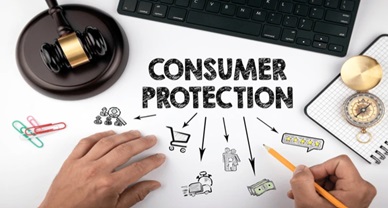Unfair Trade Practices and Deficiencies in service in the Consumer Protection Act, 2019
INTRODUCTION
This research discusses the scope and extent of the new Consumer Protection Act of 2019, as well as its effectiveness in addressing customer concerns regarding online transactions. The creation of this new Act was necessary due to the growth of a well-organized online sector for manufacturers, traders, and service providers, which significantly impacted business and customer interactions. The notion of consumer sovereignty has been seriously eroded. The Consumer Protection Act of 2019 includes similar purposes as a previous Act. Is it possible to achieve the ideals described above in today’s globalized society, or are customers still exploited? Consumers are vulnerable to deceptive advertising on TV and YouTube due to a lack of disclosure of all relevant information. The new Act attempts to broaden the definitions of “Consumer,” “service,” and “procedures” in relation to existing redressal institutions. The Act aimed to improve society’s welfare by providing direct access to the market economy.
The initiative aims to reduce society’s perception of impotence towards powerful business leaders from the standpoint of consumers. Consumers are accepting the condition as a normal part of life, rather than opposing it. Implementing concrete facts is a positive step towards addressing the issue. The dissertation clarifies new ideas and gaps in the law, with a focus on the digital age. The dissertation examines and analyzes the new law’s content.
Author’s understanding and opinion on Unfair Trade practices
The word “unfair trade practice broadly refers to any business deception of constantly sold goods or services, as well as dishonest, dishonorable, or deceptive trade activity, that is illegal or has been deemed important by a court ruling”. The unlawful rejection of any kind of coordinated action, deceptive consumer solicitation, interruption of rivals’ commercial operations, and competitor exclusion are examples of unfair commercial practices. In today’s business and startup environments, where competition is fierce, entrepreneurs will do anything to gain an advantage, even if it means using unethical trade practices. While they might gain in the short term, the organization eventually suffers, as does the entire industry and society. The product fraud could appear in a variety of ways. Sellers could also experience unanticipated financial losses resulting UTP, that in return attract many civil lawsuits.
Unfair trade practices are specified in Section 2(47) of the 2019 Consumer Protection Act.
- Producing counterfeit goods or providing subpar
- Not sending invoices or cash reminders for the products or services
- Refusing to accept or remove products or services and neglecting to return the
- Sharing the consumer’s sensitive
Examining the notion of UTP in India, the essay looks at the provisions of the Competition and Consumer Laws created in response to the problem. This research project aims to examine the problem of UTPs in India in addition to evaluating the theoretical underpinnings and divergent interpretations of “consumer welfare” in connection to unfair trade practices that are contained in both legislations. The development of UTPs in the MRTP Act, the Consumer and Competition Act (p. 2), the MRTP Act’s repeal, and other measures implemented by the Sachar and Raghavan Committees.
Unfair Trade Practices across Different Kinds of Industries:
The Pharmaceuticals Industry
The conflict between manufacturers of name-brand and generic drugs has never been resolved. Eventually, these competitions proved to be harmful leading to several instances of unethical business activities in the pharmaceutical sector. It is well known that when doctors are in charge of the patient—who is ultimately the drug’s consumer—the pharmaceutical industry has a significant impact on their prescribing practices. One should distinguish between promotion and knowledge. By educating physicians about novel medicines and their advantages and effectiveness, a medical representative may have a pre competitive effect.
Food Industry
Global concerns about unfair trade practices and the quantity and quality of food goods have grown. “Most people are aware of the stories of products being intentionally contaminated, inferior goods being concealed, or illicit gains being made by adding chemicals on purpose during manufacture, processing, packing, and storage”. Adulterants and additives are two examples.
Such unfair and immoral business tactics pose a serious risk to the health of their clients. (In May, during a raid on a mango dealer’s store in Pune, Food and Drug Administration (FDA) inspectors found 500 weight unit mangoes worth Rs. 25,000 that had been aged with a chemical called calcium carbide.) Under the limitations of the Food Adulteration Act (p. 5). It is forbidden to artificially ripen food by using inorganic ingredients. Insurance Industry: The number of insurance customers is constantly rising, and people view insurance as a crucial component of the financial services sector. In this industry, the prevalence of unethical business practices rises with the number of clients. Insurance guarantees that, in the case of a future contingent event, a client will be entitled to receive a particular benefit or payment for a loss or harm.8The promise would not be fulfilled or would be fulfilled slowly if there was no commission. Consequently, it is evident that the insurance industry values the public’s confidence in its ability to fulfill the promises it has made.
Companies frequently lure clients with alluring offers in an effort to get them to commit more. They include several significant exclusion and exemption clauses that are advantageous to large businesses.

Judicial Precedents:
- Godfrey Phillips India Ltd vs. Ajay Kumar “The lawsuit focused on the tobacco company’s challenged The product was oversubscribed under the name “red &White,” which included the statement “Red &White smokers are one of a kind.” The packet also included a photograph of actor Akshay Kumar and a statement emphasizing the dangers of smoking. The petitioner was confident that exhibiting a big celebrity supporting a cigarette10 with a tag on it would give people the notion that they possessed the authority to carry out such actions. Businesses regularly use tempting deals to entice customers, but then attempt to increase their commitment.
They were numb and this may cause the customer to lose interest in the warning. Because the complaint was also brought in civil court, the district forum dismissed it. “When the matter was presented to the National Commission, the appellants claimed that there was no evidence of any harm or disaster caused by the advertising”. The National Commission determined that the litigant was not authorized to file since the action was not brought on behalf of a volunteer organization. The allurement was provided free of charge”.
- Ravindranath Kamath v. Spice Communications Limited(IV2) “According to a Karnataka map provided by WHO, the tower would be built near the Virajpet area. Kamath submitted an application for affiliation based on their assurance and paid them Rs. 3,100. A SIM card valued Rs. 6,800 was handed away. Despite being charged Rs. 22/- per day, Kamath was unable to use his mobile phone from Virajpet due to Spice Communications’12 inability to construct the tower. For additional information, please contact Chris. Spice Communications chose not to build the tower because it was not economically feasible. Kamath received a combined payment of Rs. 30,000 and Rs. 10,000, which the Commission ruled was an unfair business practice”.
What is meant by “deficiency of service”?
According to Section 2(11) of the Consumer Protection Act 2019 (“the Act”), “a deficiency is any imperfection or defect in the feature, quality, amount, worth, authenticity, capacity or potential, and standard that is required to be maintained and regulated in accordance with the laws and statutes in function of any agreement or contract claimed by the seller with respect to the products and goods”. Willful and purposeful withholding of crucial information, as well as omission or negligence on the part of the seller that may cause injury or loss to the consumer(s), are all examples of insufficiency of service.
Authors Opinion on “Service” under Consumer Protection Act, 2019
Any act(s) that a prudent seller is supposed to do or omit but intentionally does the opposite; such activities constitute a ‘deficiency of service14‘.
Deficiencies in service can be seen in every service sector with a buyer-seller interaction, including railways, banking, legal assistance, electricity, construction, education, transportation, aviation, hospitality, restaurants, and entertainment. Deficiency of service can have small to severe repercussions, ranging from inconvenience or harassment to mental or bodily injury to death, resulting in legal implications.
The Consumer Protection Act (old and new) is a piece of legislation implemented in India only to defend and safeguard customers’ interests. The Consumer Protection Act of 2019, which went into effect on July 20, 2020, not only includes physical platforms for buyer-seller relationships, but also acknowledges services supplied via e-commerce platforms.
The definition of service has been made so wider that it includes all kinds of services such as banking, transport, finance, processing, energy, telecommunications etc. According to the authors it has both positive and negative impacts. Positive being as it includes all sectors which are important in daily lives of customers. But the negative impact being lack of clarity and no distinction between deficiency of service and simple dissatisfaction.
Inclusion of Healthcare services has been a matter of extensive debate. “Although it gives remedy to the consumers who suffer harm because of medical negligence, with time it was seen a lot of frivolous complaints can lead to use of defensive practice by doctors which in return leads to compromise in quality of medical services”.
Judicial Precedents
Indian Medical Association vs. V.P. Shanth15– According to a ruling by the Supreme Court, the Consumer Protection Act applies to the medical industry and instances of medical misconduct. This implies that patients who suffer as a result of medical malpractice are entitled to reimbursement for inadequate care from physicians or healthcare facilities in a civil court. But the only condition being the services rendered by doctor should not be free.
Gurshinder Singh vs. Shriram General Insurance Co. Ltd. & Others 202016-Reiterating its ruling from Om Prakash v. Reliance General Insurance and Anr., the Supreme Court stressed in this case that insurance claims shouldn’t be denied on the basis of procedural grounds if the cause of the delay is adequately stated and supported. The Court went on to say that if a claim has already been proven to be legitimate, it would be unfair and wrong to reject it because of a postponed complaint of theft or robbery. As a result, the Court decided that merely postponing informing the insurance company is insufficient justification for rejecting a reasonable insurance claim.
Additional Suggestion and Conclusion
In modern times, where more and more services are delivered digitally, protecting consumers’ data and giving them with relief should also be included. Specific criteria should be developed for customer transparency and fairness, particularly when AI-powered services are involved. Customers today use worldwide services on a daily basis, such as clouds, drives, and applications, thus this act should have clear cross-border transaction standards as well as a simple process for customers to address problems with foreign service.
Consumer Redressal Forum must be able to impose temporary injunctions against unfair commercial practices. Due to a defect in the former statute, many consumers suffered loss as no action was taken against the seller, merchant, or manufacturer until the problem was resolved. The court requires the ability to impose interim injunctions on demand
After the initial hearing, the court determines if a lawyer is required to prevent unnecessary delays. If the complainant hires an attorney, he must explain why. The forum should only adjourn in dire cases, not on a regular basis. After the final hearing, the verdict should be released online to prevent time-consuming appeals.
Online hearings via video conferencing can save time and money for both parties, allowing for quick resolution of small issues in the world of e-commerce.
The law does not cover all medical malpractice cases for consumers. The prior Act included the same clause; hence it should be reinstated in the new legislation. Parliaments should provide Consumer Forums with clear guidelines on their subject matter jurisdiction to avoid ambiguity. Consumer Forums frequently refuse jurisdiction, stating it falls within civil jurisdictions, which is not the case
Consumer rights education should be included in schools’ Social Studies curriculum to prevent customers from being exploited due to a lack of understanding about their rights. This can also act as a resource for parents.
Author: BHUMI SHARMA, A Student at SYMBIOSIS LAW SCHOOL, NAGPUR, in case of any queries please contact/write back to us at support@ipandlegalfilings.com or IP & Legal Filing
Reference
- (The Consumer Protection Act 2. S.)
- (The Consumer Protection Act , 2019, Section 2(7))
- (Monopolistic and Trade Restrictive Practices Act)
- (The Competition Act)
- (Prevention of Food Adulteration Act)
- (J U D G M E N T CIVIL APPEAL NO. 2339 OF 2008 (Arising out of SLP (C) No.532 of 2007) (With Civil)
- (The Consumer Protection Act 2. S.)
- (5 Indian Medical Association vs V.P. Shantha & Ors, 1995 SCC (6) 651)
- (Gurshinder Singh vs. Shriram General Insurance Co. Ltd. & Others, AIR 2020 SC 1395)
- (The Consumer Protection Act 2. )
- (IV2)


